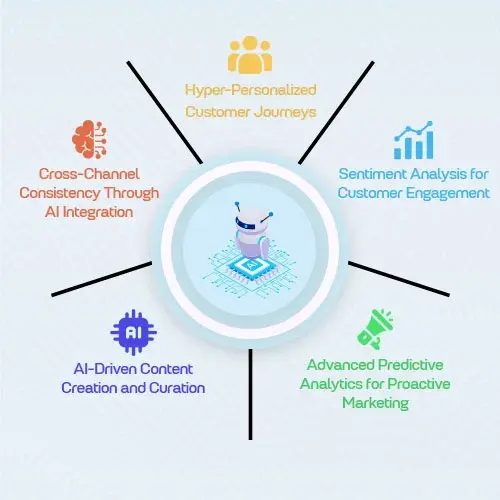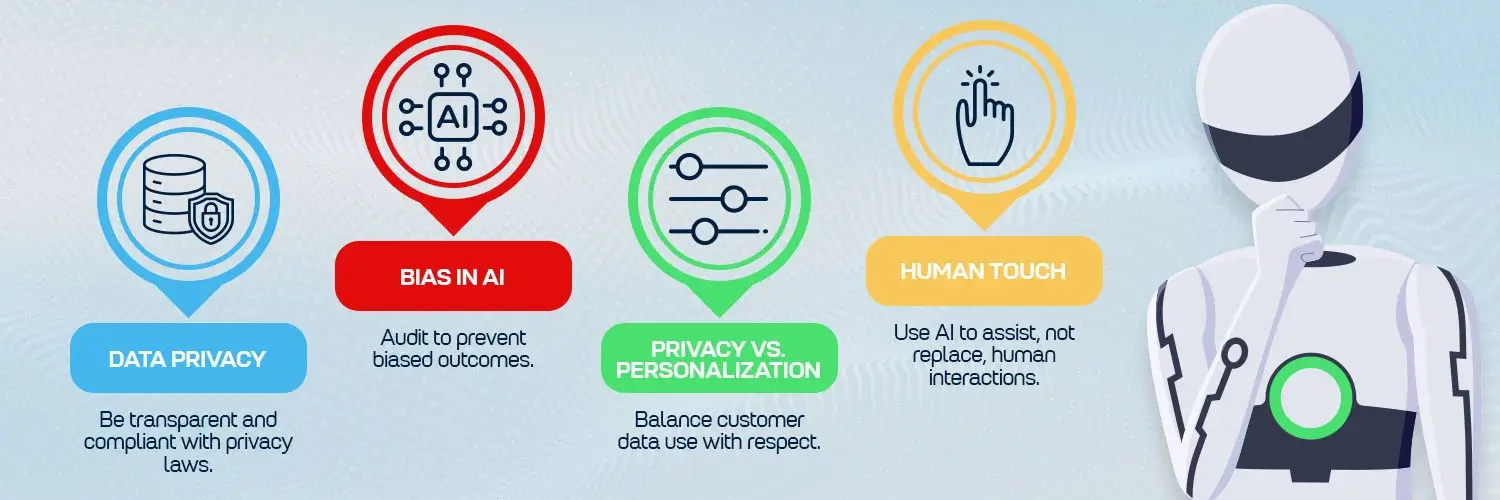
As we approach 2025, the impact of AI on marketing is set to reach unprecedented heights. From personalized marketing strategies to dynamic campaigns, AI-driven marketing is fundamentally altering how brands engage, nurture, and retain customers. With advancements in predictive analytics, adaptive content delivery, and real-time marketing automation, brands can now build deeper, data-backed relationships with customers.
In this article, we’ll explore how AI is shaping marketing strategies today, look forward to the trends expected to define 2025, and offer guidance on preparing for this transformation.
AI in marketing today is largely focused on enhancing personalized marketing strategies by delivering targeted, data-driven campaigns. Brands use AI to streamline their marketing efforts through real-time marketing automation, which enables them to reach the right customer with the right message at the right time. But beyond automation, AI also plays a crucial role in understanding and predicting customer behavior through AI-powered customer insights and predictive analytics in marketing.
For instance, leading e-commerce companies use AI to track browsing and purchase histories, offering tailored product recommendations and delivering automated follow-up emails based on prior purchases. These data-driven marketing techniques not only enhance the customer experience but also improve conversion rates and customer loyalty. AI enables brands to go beyond demographics, focusing on customer behavior and preferences for hyper-targeted marketing that drives results.
AI’s primary advantage is its ability to analyze vast amounts of data, uncover patterns, and deliver insights that would otherwise be unattainable. Unlike traditional marketing, which often relies on generalized messaging, AI-driven marketing can identify individual preferences and personalize interactions to foster more meaningful connections. This capability is essential for modern consumers who expect brands to know them and provide relevant experiences.
In addition to personalized engagement, AI offers significant efficiency gains. Through automation, AI frees marketing teams from repetitive tasks, allowing them to focus on strategy and creativity. AI-based tools like marketing optimization tools and personalization algorithms help brands deliver relevant messaging without overwhelming their teams with manual work.
Looking ahead, AI is expected to unlock even more advanced capabilities for personalized marketing strategies. Here are the key trends to watch in 2025:

As AI technology becomes more sophisticated, personalized marketing strategies will reach a new level of precision. In 2025, we expect AI to deliver hyper-personalized customer journeys that adapt in real-time. This evolution will enable brands to adjust messaging, tone, and timing based on live behavioral data, making each interaction feel unique.
AI-driven sentiment analysis is currently in its early stages, but by 2025, it will become a core component of customer engagement. Brands will be able to detect emotional cues in customer interactions—such as dissatisfaction or excitement—and tailor responses accordingly. For instance, if a chatbot detects frustration in a customer’s tone, it might escalate the conversation to a live agent or offer a personalized discount. This integration of chatbot customer service with sentiment analysis will help brands manage customer emotions more effectively.
Predictive analytics in marketing is already providing valuable insights, but by 2025, these tools will be capable of predicting customer needs with even greater accuracy. Predictive analytics will allow brands to engage with customers before they express a need, creating proactive marketing opportunities. For instance, a travel brand might predict that a customer will be interested in a vacation package at the start of summer based on previous behaviors. This capability will shift marketing from reactive to proactive, enhancing customer satisfaction and increasing sales.
By 2025, AI will play a significant role in creating and curating content. Through tools like natural language generation, brands will be able to produce personalized articles, social media posts, and product descriptions based on customer data. Adaptive content delivery will ensure that customers see content tailored to their needs, interests, and preferences, increasing engagement and loyalty.
Brands are expected to rely on AI to deliver a consistent experience across multiple channels. AI will integrate data from all touchpoints, ensuring customers experience cohesive and seamless journeys whether they’re interacting with a brand via email, social media, or website. This AI for marketing campaigns will help brands maintain a unified voice and message across all platforms, building trust and credibility with consumers.
To understand the practical benefits of AI, let’s look at some current applications and future possibilities in various industries:
Retailers are among the top adopters of AI, using it to enhance the shopping experience with predictive recommendations and inventory management. By analyzing purchasing habits, retailers can predict which products a customer is likely to buy and suggest related items, driving up sales.
For example, AI-powered tools like Amazon’s recommendation engine analyze past purchases, search history, and customer demographics to provide relevant product suggestions. As these tools evolve, retail brands will be able to recommend items that align not only with past behavior but with the customer’s current needs and lifestyle changes. By 2025, machine learning in marketing will enable retailers to provide entirely customized shopping experiences.
In the healthcare and wellness sectors, AI-powered customer insights help brands engage patients and promote healthier lifestyles. For instance, AI can track a patient’s medication schedule and send reminders to refill prescriptions or suggest personalized health tips based on recent activity. As data privacy becomes more of a priority, brands in this sector will need to find ways to balance personalization with compliance, using personalization algorithms that prioritize customer consent and data security.
In the travel industry, AI is reshaping customer engagement by providing dynamic, real-time interactions. Real-time marketing automation enables travel brands to offer destination recommendations based on seasonal trends, customer location, and past booking history. AI can also analyze social media activity to detect when customers are planning trips, allowing brands to engage them with targeted offers.
As AI advances, travel brands will be able to create fully personalized marketing strategies based on customer feedback in real time. For example, an AI system could recommend a nearby restaurant if a customer misses a scheduled activity or suggest an alternate route if travel disruptions occur.

While AI presents numerous opportunities, it also introduces ethical and logistical challenges. Here are some considerations brands should keep in mind as they integrate AI into their marketing strategies:
AI relies heavily on data, but brands must be transparent about how they collect and use customer information. Data privacy laws like GDPR in Europe and CCPA in California mandate strict data handling protocols, and non-compliance can lead to severe penalties. Brands must implement robust data privacy policies and ensure that AI algorithms are transparent to maintain customer trust.
AI models can unintentionally reinforce biases if they’re trained on unrepresentative or biased data. For example, if a recommendation algorithm is trained on data from a specific demographic, it may produce results that favor that group. Brands need to monitor and audit their AI systems to prevent unintended biases that could alienate certain customer groups.
While personalized marketing strategies are beneficial, some customers may find hyper-personalization intrusive. Brands must find a balance between delivering personalized experiences and respecting customer privacy. Offering customers more control over their data and choices for personalization can help alleviate concerns.
Although AI can handle many aspects of marketing, there’s still a need for the human touch in certain situations, especially in customer service. Brands should use AI to support, rather than replace, human interactions. For example, AI can handle routine inquiries while allowing human agents to focus on complex issues that require empathy and personal understanding.
To leverage the full potential of AI-driven marketing in 2025, businesses need to adopt a strategic approach that includes the following steps:
A unified data strategy is essential for successful AI integration. Brands should consolidate customer data from all sources, ensuring it is well-organized and accessible for AI analysis. This approach will improve the effectiveness of predictive analytics and personalization algorithms.
The tools you invest in today should be capable of growing and adapting to the increasingly sophisticated AI capabilities of tomorrow. Look for AI solutions that can scale and integrate with your existing systems to avoid needing costly overhauls in the future.
AI tools are only as effective as the people using them. Ensure your marketing team understands how to interpret AI insights, use AI-driven optimization tools, and balance automation with creativity.
As AI continues to shape marketing, ethical considerations will play a crucial role in building customer trust. Embrace transparency, fairness, and accountability in your AI practices, and make it easy for customers to understand how AI benefits their experience.
Transitioning from traditional, manual marketing strategies to AI-driven approaches requires a thoughtful, phased approach. The key to a smooth transition is to start small, gradually integrating AI tools into existing workflows while ensuring that your team has the necessary training and support.
Begin by identifying specific areas where AI can offer immediate value, such as automating customer segmentation or optimizing email campaigns with AI-powered insights. Invest in user-friendly AI platforms that complement your current marketing systems to avoid disruption. It’s also essential to maintain clear communication with your team throughout the process, ensuring they understand the benefits and feel confident using the new technology.
By piloting AI in one department or campaign first, you can refine your processes before scaling up. This incremental approach minimizes risks while allowing your business to leverage the full potential of AI without overwhelming your existing operations. With the right plan, your transition to AI-driven marketing can be seamless and highly effective.
Contact us today to learn how we can help you leverage AI to enhance your customer interactions.

1: What will AI-driven marketing look like by 2025?
It will deliver hyper-personalized, real-time experiences based on predictive insights.
2: How does AI improve customer engagement?
AI enhances customer engagement through tailored messaging, sentiment analysis, and adaptive content.
3: Why is data privacy important for AI in marketing?
Data privacy is critical to maintain customer trust and comply with regulatory standards.
4: What’s the role of sentiment analysis in customer service?
Sentiment analysis helps brands detect emotions and respond appropriately to improve customer experience.
5: How can AI help with cross-channel marketing consistency?
AI integrates data from all touchpoints, ensuring a unified experience across platforms.
For more insights on leveraging AI for marketing, visit our website.
Copyrights © 2025 SMB Business Solution | All Rights Reserved
Designed & Developed by Digital Hyperlinks (PVT) LTD.